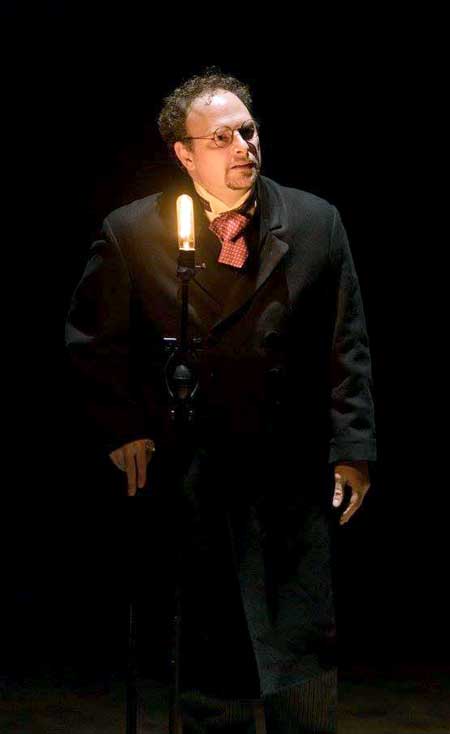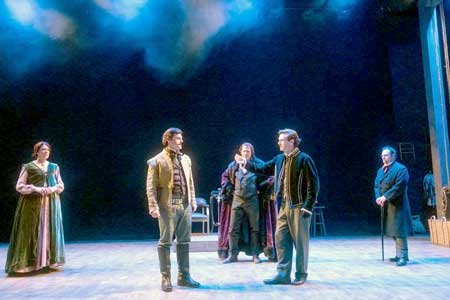Play (2017)
by Jake Broder
World Premiere
Directed by Steven Maler
Commonwealth Shakespeare Company
Presented by BabsonArts
Sorenson Center for the Arts
Babson College, Wellesley, MA
March 24 – April 2, 2017
With Will Lyman (Junius Brutus Booth), Jacob Fishel (Edwin Booth), Joe Fria (John Wilkes Booth), Jake Broder (Adam Badeau), Maureen Keiller (Mary Ann Holmes/Adelaide Delanoy), Kelby Akin (June Booth/John Sleeper Clarke), Lucy Davenport (Asia Booth/Mary Devlin)

in “Our American Hamlet”
Photo Credit: Nile Hawver/Nile Scott Shots
Courtesy of Commonwealth Shakespeare Company
and BabsonArts
Before the Booth name got taken over by the devastating actions of John Wilkes Booth (Joe Fria), it was prominently associated with acting. Junius Brutus Booth (Will Lyman) was a prominent actor and his son Edwin Booth (Jacob Fishel) became even more renowned; John Wilkes Booth had a career as an actor, but considerably less successful than his brother’s.
This interesting and evocative play explores the motivating factors for John Wilkes Booth’s turn to savagery and pairs the story metaphorically with that of Hamlet, the title role of which Edwin had commanded authoritatively and for which he became distinctively known. The story is narrated by the character of Adam Badeau, friend to Edwin Booth, and played by none other than playwright Jake Broder.
While exploring the psychodynamic relationship between the two sons and their boisterous and narcissistic father, the play imagines the significance of a Hamlet plot, filled with the betrayal of a stepfather and the rivalry between two young men. That association is a poetic embellishment to the play, gives it a bit of additional dimension, and provides a title. the title, of course, is a twist on Our American Cousin, the title of the considerably lighter play that Lincoln was watching when John Wilkes Booth shot him in 1865.
The thesis is that Junius was so irresponsibly self-involved that he set up a rivalry between his sons that ultimately was devastating to John, the less talented of the two.
The story is narrated, either directly or in slightly veiled dialogue, by the character of Adam, occasionally rendering a flavor of didacticism. There is, however, a lot to know about the territorial arrangements set up by Edwin Booth vis a vis his brother and other influential conditions that ultimately contributed to John’s devastating actions. Edwin wanted to keep his brother isolated from himself professionally, so demanded that John focus on performing in the South while he himself performed exclusively in the North. The result, as we know, is that John became a supporter of the South in the Civil War and the instigator of its most deadly act.
As Junius Booth, Will Lyman is just out of this world. I have never seen him so full of piss and vinegar in the portayal of a salty and dissolute character. He is frequently typecast as a sedate and lordlike presence, not at all like this role. He performs this role with incredible agility, verve and abandon and it’s completely worth the cost of admission.

Jacob Fishel, Jake Broder
in “Our American Hamlet”
Photo Credit: Nile Hawver/Nile Scott Shots
Courtesy of Commonwealth Shakespeare Company
and BabsonArts
As Edwin, Jacob Fisher is commanding and self-possessed, and as John, and Joe Fria adeptly conveys the compressed familial anxiety that the play offers as the cause for his violent actions.
Playwright/actor Jake Broeder holds the connective tissue of narration down with sedate aplomb and Maureen Keiller provides ballast as Junius’ wife and the mother of the sons.
An inventive stage design provides the back view of a proscenium which appears to open outwards at the back of the stage. At times the stage space feels a bit too expansive for the contained action. when Lyman is doing his wild thing onstage it does not feel so, but with the more intimate and controlled scenes, especially between the brothers, a bit more shaping and limiting of the space by one means or another would have been desirable.
Known best for its expert and exceedingly popular productions on the Boston Common each summer, Commonwealth Shakespeare, under Artistic Director Steve Maler, here offers in a different venue a taste of its solid talents in a non-Shakespearean play that has interesting Shakespearean associations.
Giving a good amount of personal background and insight into the workings of this thespian family, providing a searing portrait of Junius Booth, and offering a vivid account of the sorts of manipulations that led Edwin to isolate John as an actor in the South, the play gives a rich and useful understanding of the precursors to violence in this particularly devastating case. This capable production of a new and interesting play provides a great source of reflection on that tragic tale.
The Huntington Theatre Company concurrently has Topdog/Underdog by Suzan-Lori Parks in production and, with its searing portrayal of two African-American brothers named Booth and Lincoln, it provides a great pairing with Our American Hamlet.
– BADMan
Leave a Reply